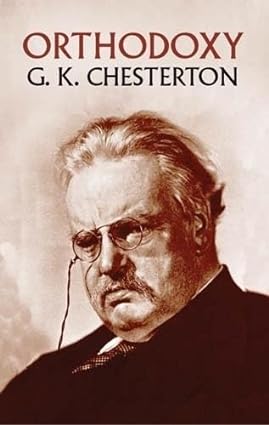This week we are reading through the penultimate chapter of Orthodoxy where Chesterton brings together his arguments in the prior seven chapters. Chesterton doesn’t argue that orthodox Christian beliefs are correct, but that normative Christian beliefs are “romantic.” Once more Chesterton is using a term in a classic literary sense. For Chesterton “romance” isn’t Nicholas Sparks but King Arthur – a tale of marvelous adventures, heroic knights, and grand battles. Christianity is a grand story full of danger and suspense. “In Christian morals, in short, it is wicked to call a man ‘damned’ [for where is the adventure if we know the end]: but perfectly religious and philosophic to call him damnable [for that leaves his fate uncertain].” We don’t have to agree with Chesterton, but it is Christianity as a great story (beginning with the fairy tales of the nursery), that causes his conversion.
Within the chapter, Chesterton gives five examples as to why orthodox Christianity is an adventure and its opposite is not:
1. Materialism rejects miracles and so binds the Creator leaving nothing free in the universe. Where is the adventure if even God is bound? (“Calvinism binds man, materialism binds God.)
2. Pantheism (Buddhism) rejects division and teaches everything is really only one thing. But how can we love if there is not an object separate from ourselves to love?
3. Unitarianism/Islam exalts despotism and the concentration of power. But it’s neither good for man nor for God to be alone. Romance is in complexity and community.
4. Fatalism/Universalism presupposes the answer. Where is the adventure if there are no cross-roads to take accompanied by the freedom to choose a direction?
5. Arianism teaches that Jesus is only a man and not God. But what is more adventurous than having God himself suffer temptation, doubt, and even atheism?
As you read through the chapter, think of how Christianity is that great adventure, and of what it is like to be called and to follow him. Instead of giving a clear cogent account of your faith to others, what if we just asked them to join us on this our romantic adventure, like Jesus did when he called his disciples?
The next day again John was standing with two of his disciples, and he looked at Jesus as he walked by and said, “Behold, the Lamb of God!” The two disciples heard him say this, and they followed Jesus. Jesus turned and saw them following and said to them, “What are you seeking?” And they said to him, “Rabbi” (which means Teacher), “where are you staying?” He said to them, “Come and you will see.” So they came and saw where he was staying, and they stayed with him that day, for it was about the tenth hour.One of the two who heard John speak and followed Jesus was Andrew, Simon Peter’s brother. He first found his own brother Simon and said to him, “We have found the Messiah” (which means Christ). He brought him to Jesus. Jesus looked at him and said, “You are Simon the son of John. You shall be called Cephas” (which means Peter).
John 1:35-51
The next day Jesus decided to go to Galilee. He found Philip and said to him, “Follow me.” Now Philip was from Bethsaida, the city of Andrew and Peter. Philip found Nathanael and said to him, “We have found him of whom Moses in the Law and also the prophets wrote, Jesus of Nazareth, the son of Joseph.” Nathanael said to him, “Can anything good come out of Nazareth?” Philip said to him, “Come and see.” Jesus saw Nathanael coming toward him and said of him, “Behold, an Israelite indeed, in whom there is no deceit!” Nathanael said to him, “How do you know me?” Jesus answered him, “Before Philip called you, when you were under the fig tree, I saw you.” Nathanael answered him, “Rabbi, you are the Son of God! You are the King of Israel!” Jesus answered him, “Because I said to you, ‘I saw you under the fig tree,’ do you believe? You will see greater things than these.” And he said to him, “Truly, truly, I say to you, you will see heaven opened, and the angels of God ascending and descending on the Son of Man.”

